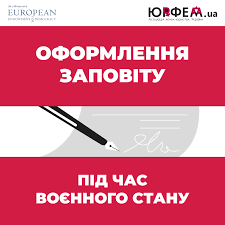lawyer, 23 years of experience in enforcement.
DRAWING UP A WILL IN UKRAINE DURING THE RULE OF MARTIAL STATUS
All authority regarding the distribution of personal belongings and the appointment of future beneficiaries is in the hands of each person. They have the ability to convey their intentions through the act of creating a will - a will.
In the event of a person's death, a will serves as a personal disposition. According to the Civil Code of Ukraine (hereinafter - the Code), natural persons with full civil legal capacity have the right to make a will, which must be executed by them independently. It is strictly forbidden to engage a representative to execute the will.
To ensure clarity and avoid any disputes in the future, the will is made in writing, indicating the place, date and time of its making, as well as the date and place of birth of the testator. It is important that the document is drafted in such a way that there is no room for misunderstandings regarding the will of the testator after the opening of the inheritance. Ownership of property can be transferred only on the basis of the provisions set out in the will. The testator personally signs the will, unless he is physically unable to do so, in which case he signs in accordance with the relevant legal code. The document must be officially certified by a notary public. The testator has the option to write the will by hand or using accepted technological means. Alternatively, they can seek the help of a notary who can record the will based on the testator's verbal instructions, either by hand or using accepted technological means. In such cases, the testator must read the will out loud and sign it in his own hand. In the event that the testator cannot personally read the will due to physical disabilities, the will must be witnessed in the presence of witnesses. Similarly, if the testator is physically unable to sign the will due to disability, illness or any other reason, it is permissible for another person to sign the will on behalf of the testator.
During the probate of the will, the testator is not required to provide proof of ownership. In addition to notaries, officials authorized by local self-government bodies in rural areas are empowered to certify a will.
At the same time, the legislation provides that other persons, except notaries, have the right to certify wills, which gives them the same legal force. For example, persons undergoing treatment in hospitals and other health care facilities, as well as residents of residential homes for the elderly and facilities for the disabled can have their wills certified by the chief physician, deputy from the medical department, or the doctor on duty. the relevant institution. Similarly, the captain of a sea or river vessel under the Ukrainian flag has the right to certify the will of any person on board. In addition, the leader of the search or expedition operation has the authority to certify the will of any participant participating in the said mission.
In the absence of a notary or a person authorized to perform notarial acts, the will of a military serviceman, as well as the will of an employee or a family member of a military serviceman, may be certified by the commander or head of the relevant unit. military unit, institution, institution. In the same way, the will of a person who is in a penal institution or a detention center can be certified by the head of this institution or detention center. These certifications are conducted in the presence of witnesses who must have full legal capacity.
It is important to know that wills are subject to registration in the Inheritance Register in accordance with the procedure established by the Cabinet of Ministers of Ukraine. However, during times of war or state of emergency, when access to the Inheritance Register is not possible, notarization, amendment and cancellation of wills can still be carried out without using this register. After restoring access to the registry, the relevant information will be entered within five working days.
We draw your attention to the fact that in the conditions of martial law, as stated in the Resolution of the CMU dated February 28, 2022 No. 164 "Some notarial cases in the conditions of martial law", the wills of servicemen of the Armed Forces of Ukraine, as well as other military and law enforcement agencies that ensure national security and defense, may be certified by their managers or authorized persons. These certified wills are sent through the General Staff of the Armed Forces, the Ministry of Defense or the relevant law enforcement agency to the Ministry of Justice or its territorial branch for registration by notaries in the Inheritance Register. In addition, the head of the POW camp has the authority to certify the POW's will.
It is important to note that the testator has the right to appoint one or more persons as heirs, regardless of any family or other civil relations. The testator also has the right to remove any legal heir from the inheritance without giving a specific reason. However, the powers of the testator do not include disinheritance of persons who have the right to a mandatory share in the inheritance. The validity of the will with respect to persons who have the right to a mandatory share is determined by the moment of the opening of the inheritance. Minor children, adult disabled children, disabled husband (wife), disabled parents of the testator inherit half of the shares due to them regardless of the terms of the will (mandatory share). The court may reduce the size of the mandatory share, taking into account the relationship between these heirs and the testator, as well as other circumstances that are of significant importance. Any restrictions or burdens placed on an heir entitled to a mandatory share will only apply to the portion of the estate that exceeds their mandatory share.
At the time the will is made, the testator has the power to include his existing rights and obligations, as well as any future rights and obligations that may arise. They have the right to distribute all or part of their inheritance by will. In the event that the testator in the will single-handedly designates his rights to the heirs, the corresponding duties, proportional to the granted rights, pass to the designated heirs. The legality of the will regarding the distribution of the inheritance is determined by the moment of entry into the inheritance.
It is important to recognize that the testator has the ability to set the terms of the inheritance rights of a specified person in the will, regardless of whether those terms are directly or indirectly related to his conduct. These conditions can vary from the presence of other heirs and special residence requirements to the birth of a child or educational achievements. It is important to note that these conditions must be present at the time the inheritance is opened. However, it is important to understand that any condition that is contrary to the law or moral principles of society is considered void.
A will may contain provisions that go beyond the distribution of property. For example, it may specify details regarding the place and manner of burial of the testator, express a preference for custody of a minor, or outline actions to be taken to achieve a specific socially beneficial goal.
The testator has the right to revoke the will at any time. They have the right to make a fresh will whenever they want. A subsequent will shall revoke and set aside any conflicting provisions of the previous will in whole or in part. Each new will replaces the previous one and does not restore the previous will made by the testator. The testator reserves the right to change the document at his discretion. The act of revoking the will and making changes to it must be executed by the testator personally.
So, as can be seen from the above, the execution of a will is a rather important transaction, and during its execution, it is advisable to obtain the services of a lawyer or the sound advice of a lawyer.
Legal service "Consultant" provides all types of legal services, including online legal services. Specialists of our service will make a legal analysis of the situation to determine the procedure for obtaining an inheritance abroad and will help collect the necessary documents and, if necessary, accompany the court process.




































